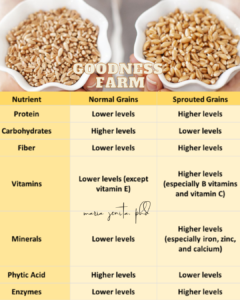"Sprouted Grains vs Normal Grains: A Nutritional Breakdown"
Share

Here's a more detailed breakdown of the nutritional differences between normal grains and sprouted grains:
- Carbohydrates: Sprouted grains tend to have lower levels of carbohydrates compared to normal grains. During the sprouting process, the starches in the grain are broken down into simple sugars, which makes them easier to digest and may help regulate blood sugar levels.
- Fiber: Sprouted grains tend to have higher levels of fiber compared to normal grains. This is because the sprouting process increases the activity of enzymes that break down the grain's cell walls, making it easier for the body to absorb the fiber.
- Protein: Sprouted grains tend to have higher levels of protein compared to normal grains. During the sprouting process, the proteins in the grain are broken down into amino acids, which are easier for the body to absorb and utilize.
- Vitamins: Sprouted grains tend to have higher levels of vitamins compared to normal grains, especially vitamins B and C. This is because the sprouting process increases the activity of enzymes that break down the grain's cell walls, making it easier for the body to absorb the nutrients.
- Minerals: Sprouted grains tend to have higher levels of minerals compared to normal grains, especially iron, zinc, and calcium. This is because the sprouting process activates enzymes that break down phytic acid, a compound that binds to minerals and reduces their absorption by the body.
- Phytic acid: Sprouted grains tend to have lower levels of phytic acid compared to normal grains. Phytic acid is a compound found in grains that can bind to minerals and reduce their absorption by the body. The sprouting process activates enzymes that break down phytic acid, making the minerals in the grain more available for absorption.
Thus, sprouted grains are considered to be more nutritious than normal grains because they have higher levels of vitamins, minerals, and enzymes. The sprouting process also reduces the amount of phytic acid in the grain, which can interfere with the absorption of certain nutrients.
Additionally, sprouted grains are easier to digest than normal grains due to the increased enzyme activity. The reduction in carbohydrates and increase in fiber also make sprouted grains a good choice for people who are watching their blood sugar levels.
Note: This is a simplified inference from the laboratory based experiments (by an average of triplet results) conducted on a variety of grains (normal and sprouted), at Centre for Food Technology, Anna University, Chennai.
